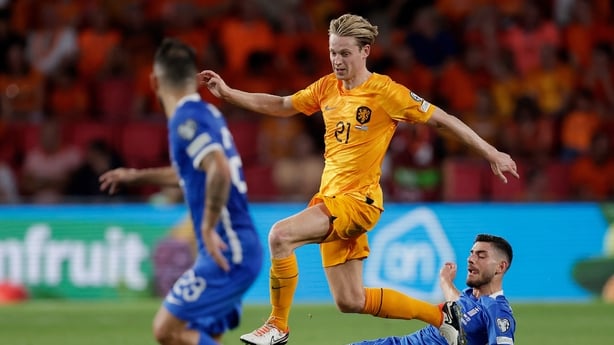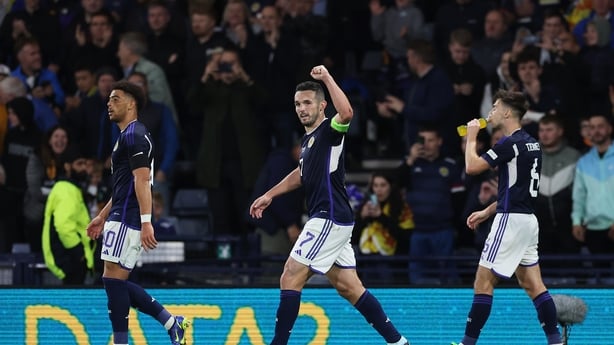Once drawn alongside France and the Netherlands in the qualification phase for Euro 2024, there was a strong sense that the Republic of Ireland would be looking for a back avenue into the tournament.
Four games in, arriving at the half-way stage of the Group B campaign, nothing has changed to alter that initial instinct.
Three defeats and a solitary home victory – a hard-fought one at that – against the lowest-ranked side in the group, Gibraltar, while also going down to the fourth-ranked Greece in Athens.
In truth, aside from a creditable performance in the opening game against France, where Ireland were narrowly beaten, there has been little to get excited about.
Out-manoeuvred in Athens, outclassed in Paris, and out of sorts in the opening 45 minutes against the men from the tip of the Iberian peninsula, and yet somehow, Ireland cling on to the fact that they are not out of the race for the second qualification spot.

The Netherlands would, no doubt, feel a bit bemused and just a touch offended to be considered part of this mini group of three for that second spot for Germany next year.
But their 4-0 hammering from France in the opening game, coupled with their Nations League duties mean that they have yet to put the points or the performances on the board to suggest that they are closer to the level of French than that of Ireland or Greece.
There was a solid start to putting that scenario to bed in Eindhoven on Thursday night, as they easily accounted for Greece with three first-half goals securing the points, and they will be looking for, and expecting, more of the same in Dublin on Sunday night.
But they will have to tread carefully against a wounded side like Ireland who, at this stage, really have nothing to lose in the group and will be gung-ho for a victory to attempt to put themselves back in the picture.
From Ireland's perspective, anything other than a win and the harsh reality is that the campaign will be all but over.
The maximum return of 13 points could just about be enough, pending on results elsewhere, while they would also have to beat Greece and Gibraltar, and somehow win away in the Netherlands.
Not necessarily impossible, but based on what we have seen so far, highly unlikely.
So while all Ireland’s attention has been focused on Group B, it is probably about time to delve into the comings and goings in the other nine groups to see how Stephen Kenny’s side fares in the overall shakeup.
Twenty places at the tournament go to the top two in all ten groups, while Germany qualify as hosts, which leaves three more spots up for grabs.
Despite early misgivings, the UEFA Nations League has now been broadly welcomed in filling those international windows between major tournaments, with the added bonus being that UEFA allocates those three remaining places in their big event based on the Nations League.
Leagues A, B, and C are allocated one place each with the winner of each play-off, consisting of a semi-final and final, secure safe passage to the upcoming Euros.

The theory is that if you win your group in the Nations League, you are guaranteed a play-off, but if you qualify automatically, the next ranked side will be promoted into the vacant place.
Ireland, of course, did not win their group, nor did they come second, finishing third behind Scotland and Ukraine, however, they still have a real possibility of making the play-offs, due to the fact that a large number of League A and League B will automatically qualify from their groups.
At the last Euros, Ireland inveigled a play-off invitation, despite finishing last in their Nations League group, however, they fell at the first hurdle, losing on penalties to Slovakia in Bratislava – a remarkable few days mid-Covid which essentially defined Stephen Kenny’s tenure with bad luck off the pitch and near misses on it.
Ireland are currently ranked 26th in the process, and it is not immediately clear-cut t if they will make it through to the play-offs.
Euro 2020 champions and League A group winners Italy are not currently inside the top two in their groups, and they would need to qualify via the play-off route.
The Italians have games in hand, however, as they missed out on the June qualifier window due to the final stages of the Nations League.
However, there are some other interesting scenarios that are currently dictating that Ireland might miss out.
League C teamsTurkey and Slovakia are currently in the automatic qualifying spots in their respective groups, while League B teams, ranked lower than Ireland, Albania and Romania are in a similar situation.
In League B, Iceland, Norway, Israel, Bosnia and Herzegovina, and Slovenia are ahead of Ireland in the ranking for a play-off, and all five currently reside outside the top two in their groups.
Similarly, Wales and Poland from Group A are struggling to gain automatic qualification, so Ireland will be looking closely at other results between now and November. If the play-offs were decided today, Ireland and Slovenia would miss out.
Of course, everything can and will change between now and the end of the qualifying stages, and only then will it be determined which 12 teams move into the March play-offs.
The likelihood, though, is that all the League A teams, with Wales the possible exception, will qualify automatically, which means that three League B teams will be promoted to the League A play-offs, freeing up enough spots that should see Ireland sneak into the League B equivalent.
The chance of course remains that by the time the Euro 2024 qualifying stages come to a conclusion, Ireland will have secured second place in the group following a run of four wins, including home and away victories against the Dutch, starting on Sunday night.
However, if Kenny’s era of misfortune on and off the pitch is to follow its current trajectory, those March dates may prove a vital last-chance saloon to secure a golden ticket to the summer showpiece.


